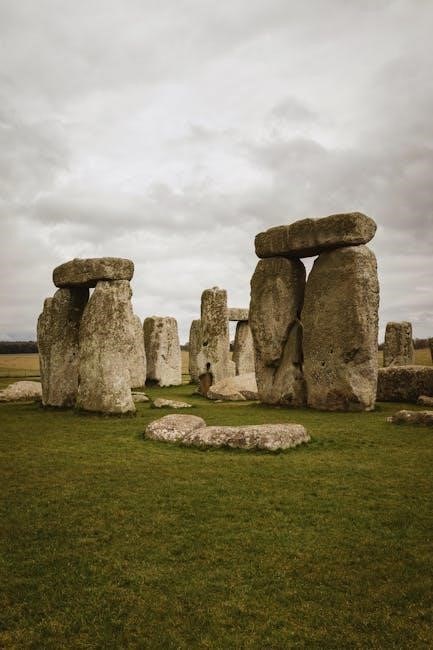The 99 Names of Allah, known as Asma ul Husna, are divine attributes describing His perfection. Found in the Quran and Hadith, they guide Muslims in worship and understanding Allah’s nature. Memorizing them is a virtuous act, promising Paradise.
Origin and Significance in Islam
The 99 Names of Allah, or Asma ul Husna, originate from the Quran and Hadith, highlighting Allah’s divine attributes. These names emphasize His mercy, wisdom, and power, serving as a foundation for understanding His nature. Prophet Muhammad (PBUH) stated that memorizing these names leads to Paradise, making them a central part of Islamic faith. They are integral to worship, guiding believers in supplication and reflection, and fostering a deeper spiritual connection with Allah.

Understanding the Divine Attributes
The 99 Names of Allah reveal His divine qualities, such as mercy, wisdom, and power. These attributes, sourced from the Quran and Hadith, guide Muslims in understanding Allah’s nature, fostering a deeper connection and reverence for His divine perfection.
Definition and Meaning of Asma ul Husna
Asma ul Husna, or the 99 Names of Allah, are divine attributes describing Allah’s perfect qualities. Each name, such as Ar-Rahman (The Most Merciful) and Al-Malik (The King), reflects His unique characteristics. These names, derived from the Quran and Hadith, provide a profound understanding of Allah’s nature, emphasizing His mercy, wisdom, and power. Learning and reflecting on these names deepens spiritual connection and reverence, guiding Muslims in worship and daily life.
Importance of Memorizing the 99 Names
Memorizing the 99 Names of Allah, or Asma ul Husna, is highly encouraged in Islam. It strengthens faith, deepens spiritual connection, and fosters a profound understanding of Allah’s divine attributes. The Prophet Muhammad (PBUH) emphasized that memorizing these names leads to Paradise. This practice not only enhances worship but also guides believers in reflecting on Allah’s mercy, wisdom, and power, inspiring a life aligned with His will and teachings.

Listing the 99 Names of Allah
The 99 Names of Allah, or Asma ul Husna, are listed with their Arabic script, English transliterations, and meanings. Each name reflects a unique divine attribute, such as Ar-Rahman (The Most Merciful) and Al-Malik (The Sovereign), offering insight into Allah’s nature and inspiring worship and reflection.
Arabic Names, Transliterations, and English Meanings
The 99 Names of Allah are presented in Arabic script, accompanied by their transliterations and English translations. Each name, such as Ar-Rahman (The Most Merciful) and Al-Malik (The Sovereign), reflects a unique divine attribute. These names are not merely translations but carry profound theological significance, offering insights into Allah’s nature. The Arabic text preserves the linguistic beauty, while transliterations and meanings make them accessible for non-Arabic speakers. This structured approach facilitates understanding and connection with Allah’s divine qualities.
Categorization Based on Divine Qualities
The 99 Names of Allah are categorized into divine qualities, such as mercy, sovereignty, and wisdom. Names like Ar-Rahman (The Most Merciful) and Ar-Raheem (The Bestower of Mercy) emphasize Allah’s compassion. Others, like Al-Malik (The King) and Al-Quddus (The Pure One), highlight His dominion and purity. This categorization helps believers reflect on specific attributes, fostering a deeper understanding and connection with Allah’s divine nature and attributes as described in the Quran and Hadith.

Benefits and Virtues of the 99 Names
Memorizing the 99 Names of Allah leads to Paradise, as per a hadith. They bring spiritual growth, guidance, and a deeper connection with Allah’s divine attributes and mercy.
Spiritual and Religious Significance
The 99 Names of Allah hold profound spiritual and religious significance, reflecting Allah’s divine attributes. They are mentioned in the Quran and Hadith, guiding Muslims in worship and understanding Allah’s nature. Memorizing them is a virtuous act, promising Paradise. These names deepen one’s faith, foster a sense of humility, and provide comfort. They are used in supplications and prayers, helping believers connect with Allah on a personal level. Their recitation is believed to bring blessings and spiritual growth, enriching one’s relationship with the Almighty. This practice is highly recommended in Islamic teachings, emphasizing devotion and mindfulness.
Practical Applications in Daily Life
The 99 Names of Allah offer practical guidance for daily life, helping believers connect with Allah’s attributes. Reciting specific names, like Ar-Razzaq for sustenance or Al-Hadi for guidance, can enhance devotion. Using these names in supplications strengthens faith and provides solace. They inspire ethical behavior, fostering compassion, justice, and wisdom. Integrating the names into daily routines, such as in prayers or reflections, promotes mindfulness and gratitude. This practice enriches spiritual and worldly life, offering a meaningful way to seek Allah’s blessings and live righteously.

How to Memorize the 99 Names
Memorizing the 99 Names of Allah can be achieved through repetition, using flashcards, and setting daily goals. Utilize PDF guides or apps for structured learning, enhancing spiritual growth and connection with Allah.
Effective Techniques for Learning
To memorize the 99 Names of Allah, break the list into manageable sections and review them daily. Use flashcards or apps to enhance retention. Repeat each name aloud, focusing on its meaning and pronunciation. Incorporate the names into daily prayers or supplications for practical application. Consistency is key; dedicate a few minutes each day to review and reflect on the divine attributes. Utilize downloadable PDF guides or multimedia resources for structured learning, ensuring steady progress in mastering Asma ul Husna.
Resources and Tools for Memorization
Utilize downloadable PDF files and multimedia assets to facilitate learning. Apps and websites offer interactive lessons, English translations, and audio recitations. Flashcards and spaced repetition systems enhance retention. Engage with community groups or online forums for support. Incorporate visual aids like infographics or posters to reinforce memory. Accessible tools cater to diverse learning styles, making memorization accessible and effective for everyone.

Cultural and Historical Context
The 99 Names of Allah are deeply rooted in the Quran and Hadith, reflecting Islamic culture and inspiring art, literature, and worship for centuries. They embody divine wisdom and guidance, shaping Muslim identity and spiritual practices across generations.
References in the Quran and Hadith
The 99 Names of Allah are frequently mentioned in the Quran, emphasizing His divine attributes. A well-known Hadith by Prophet Muhammad (peace be upon him) highlights that memorizing these names leads to Paradise. The Quranic verses and Prophetic narrations underscore the significance of these names, providing a spiritual framework for understanding Allah’s nature. They are central to Islamic theology, guiding believers in worship and reflection;
Impact on Islamic Art and Literature
The 99 Names of Allah have profoundly influenced Islamic art and literature, inspiring calligraphy, poetry, and devotional works. Their divine attributes are often depicted in intricate calligraphic designs, symbolizing spiritual beauty. Islamic literature frequently incorporates these names to evoke reverence and deepen faith. They are also used in illuminated manuscripts and digital resources, blending tradition with modernity to inspire reflection and artistic expression in Muslim communities worldwide.

Downloadable Resources
Download PDFs, MP3s, and other digital materials containing the 99 Names of Allah in English. These resources offer convenient access for learning, reflection, and sharing divine attributes.
PDF Files and Multimedia Assets
Various digital resources are available, including PDF files and multimedia assets, to facilitate easy access to the 99 Names of Allah in English. These resources provide Arabic text, transliterations, and English meanings, making them ideal for learning and memorization. Multimedia assets such as MP3 recordings offer an audible learning experience, while PDF files are perfect for printing or sharing. These tools enhance understanding and reflection on Allah’s divine attributes, aiding spiritual growth and deeper connection with faith.
Benefits of Using Digital Materials

Digital materials like PDF files and multimedia assets offer unparalleled convenience and accessibility. They allow learners to study the 99 Names of Allah anytime, anywhere, on various devices. Interactive features such as audio recitations and transliterations enhance comprehension. These resources are easily shareable, enabling spreading of knowledge. Digital formats also reduce physical storage needs and provide a sustainable way to preserve sacred texts. They cater to modern learning preferences, making the divine attributes of Allah more accessible and engaging for spiritual growth and reflection.

Practical Applications of the Names
The 99 Names of Allah are integral to daily worship, offering guidance for supplication and reflection. They inspire gratitude, humility, and trust in Allah’s divine plan, enriching spiritual life.
Using the Names in Supplication and Prayer
Muslims invoke the 99 Names of Allah in supplication to seek blessings, guidance, and forgiveness. Each name reflects Allah’s divine attributes, making prayers more heartfelt and aligned with His will. Using these names strengthens one’s connection to Allah, fostering humility and devotion. Reciting them in prayer enhances spiritual focus and gratitude, while seeking Allah’s mercy through His names is a powerful act of worship deeply rooted in Islamic tradition and teachings.
Reflection and Contemplation Practices
Reflecting on the 99 Names of Allah deepens spiritual understanding and connection with His divine attributes. Contemplation involves pondering each name’s meaning, fostering humility and gratitude. Muslims often meditate on these names during quiet moments, allowing the attributes to inspire righteous living. This practice strengthens faith, nurtures a sense of closeness to Allah, and guides believers in aligning their lives with His will, fostering inner peace and spiritual growth through meaningful reflection.
The 99 Names of Allah are profound expressions of His divine nature, offering guidance for worship and spiritual growth. Memorizing and reflecting on them fosters a deeper connection with Allah, enriching faith and life.
Summarizing the Value of the 99 Names
The 99 Names of Allah embody profound divine attributes, revealing His mercy, wisdom, and power. Rooted in the Quran and Hadith, they offer spiritual guidance and inspiration. Memorizing these names strengthens faith, fosters a deeper connection with Allah, and promises Paradise. They are not just titles but reflections of His infinite perfection, guiding believers in worship, supplication, and daily life. Their study and contemplation enrich Islamic spirituality, providing a timeless framework for understanding Allah’s nature and cultivating a meaningful relationship with Him.



